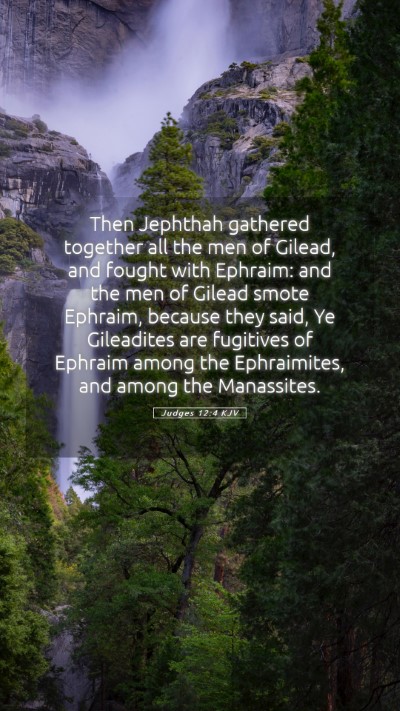Old Testament
Genesis Exodus Leviticus Numbers Deuteronomy Joshua Judges Ruth 1 Samuel 2 Samuel 1 Kings 2 Kings 1 Chronicles 2 Chronicles Ezra Nehemiah Esther Job Psalms Proverbs Ecclesiastes Song of Solomon Isaiah Jeremiah Lamentations Ezekiel Daniel Hosea Joel Amos Obadiah Jonah Micah Nahum Habakkuk Zephaniah Haggai Zechariah MalachiJudges 12:4 Meaning
What is the meaning of Judges 12:4?
Then Jephthah gathered together all the men of Gilead, and fought with Ephraim: and the men of Gilead smote Ephraim, because they said, Ye Gileadites are fugitives of Ephraim among the Ephraimites, and among the Manassites.
Judges 12:4 Bible Verse Meaning
Bible Verse Commentary: Judges 12:4
Judges 12:4 states: "Then Jephthah gathered together all the men of Gilead, and fought with Ephraim: and the men of Gilead smote Ephraim, because they said, Ye Gileadites are fugitives of Ephraim among the Ephraimites, and among the Manassites."
Understanding Judges 12:4
This verse highlights a critical moment in the conflict between the Gileadites and Ephraimites, providing a window into the struggles faced during the period of the Judges in Israel's history. The events recorded here illustrate themes of tribal rivalry, the complexity of leadership, and the repercussions of harsh words.
Bible Verse Meanings
To gain a deeper understanding of Judges 12:4, it is vital to explore various commentaries that shed light on the text:
- Matthew Henry: Henry emphasizes the significance of unity among the tribes of Israel and how strife can lead to violence and discord. He highlights the Gileadites' response to the Ephraimites' derogatory remarks, indicating a fierce pride in their military prowess and the historical tensions that fueled their conflict.
- Albert Barnes: Barnes provides insight into the backdrop of this confrontation, focusing on the perceived slights that the Ephraimites directed at the Gileadites. He notes that this verse serves as an example of the broader narrative of conflict during the time of the Judges, showcasing the consequences of tribal jealousy and insults.
- Adam Clarke: Clarke expands on the implications of the verse by interpreting the state of national identity in ancient Israel. The Gileadites were confronted by the Ephraimites not just in battle but in their identity and stature among the tribes. Clarke's commentary highlights the notion of being labeled as "fugitives" or lesser tribesmen, which provoked a fierce reaction from Jephthah and his men.
Key Themes in Judges 12:4
- Tribal Rivalry: The conflict between Gilead and Ephraim exemplifies the ongoing tribal tensions within Israel, often arising from pride and disputes over status.
- Leadership and Conflict: Jephthah's gathering of men reflects the nature of leadership during this time, marked by the need to defend honor and territory.
- Verbal Insults and Warfare: The verse illustrates how words can catalyze conflict—a reminder of the power of speech and its consequences in a community setting.
Application of the Verse
From a biblical study insights perspective, the events of Judges 12:4 prompt reflection on interpersonal conflicts in our lives. The narrative encourages individuals to be mindful of how their words can cause division and strife, particularly within groups such as bible study groups. It invites readers to consider how disputes can lead to larger consequences and the importance of reconciliation and unity.
Related Biblical Cross References
- Judges 8:1 - Examines the tensions that arose between the tribes of Ephraim and Gideon.
- 1 Samuel 10:27 - Discusses criticism faced by Saul from certain members of the Ephraimite tribe.
- James 3:5-10 - Offers wisdom on the power of the tongue and the importance of careful speech.
Conclusion
Judges 12:4 serves as a poignant reminder of the dynamics within the Israelite tribes and the larger themes of conflict, identity, and communication. For those engaged in bible study lessons, this verse provides rich material for discussion and application, prompting reflections on the importance of unity in faith communities and the careful consideration of our words.


